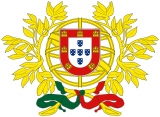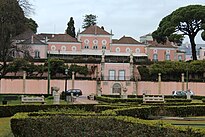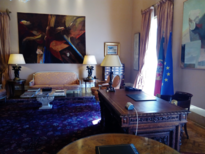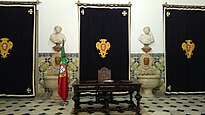| President of the Portuguese Republic | |
|---|---|
| Presidente da República Portuguesa | |
 Coat of arms used by the presidency Coat of arms used by the presidency | |
 Presidential standard Presidential standard | |
 Incumbent IncumbentMarcelo Rebelo de Sousa since 9 March 2016 | |
| Presidential Office of the Portuguese Republic | |
| Style | Mr President (informal) His Excellency (diplomatic) |
| Type | Head of state |
| Member of |
|
| Residence | Belém Palace |
| Seat | Lisbon, Portugal |
| Appointer | Direct election |
| Term length | Five years, renewable once consecutively |
| Precursor | Monarch |
| Formation | 5 October 1910; 114 years ago (1910-10-05) |
| First holder | Manuel de Arriaga |
| Deputy | President of the Assembly |
| Salary | €137,662 annually |
| Website | presidencia.pt |
The president of Portugal, officially the president of the Portuguese Republic (Portuguese: Presidente da República Portuguesa, pronounced [pɾɨziˈðẽtɨ ðɐ ʁɛˈpuβlikɐ puɾtuˈɣezɐ]), is the head of state and highest office of Portugal.
The powers, functions and duties of prior presidential offices, and their relation with the prime minister and cabinets have over time differed with the various Portuguese constitutions. Currently, in the Third Republic, a semi-presidential system, the president holds no direct executive power, unlike his counterparts in the United States and France. However, even though he is in general a ceremonial figure, he holds some powers not that usual in parliamentary systems: one of his most significant responsibilities is the promulgation of all laws enacted by the Assembly of the Republic (parliament) or the Government (an act without which such laws have no legal validity), with an alternative option to veto them (although this veto can be overcome in the case of laws approved by Parliament) or send them to the Constitutional Court for appreciation of whether they violate the Constitution. This and other abilities imply that the president of Portugal does not fit clearly into either of the three traditional powers – legislative, executive and judicial –, acting instead as a sort of "moderating power" among the traditional three.
The current president of Portugal is Marcelo Rebelo de Sousa, who took office on 9 March 2016.
Role
The Portuguese Third Republic is a semi-presidential system. Despite being a rather ceremonial figure, unlike most European presidents, who are at large ceremonial figures, the Portuguese President is vested with more extensive powers. Although the prime minister and parliament oversee and direct much of Portugal's actual governmental affairs, the president wields significant influence and authority, especially in the fields of national security and foreign policy, however, always on the advice of the Government and the approval of Parliament. The president is the supreme commander of the Armed Forces, holds the nation's most senior office, and outranks all other politicians.
Prior to the Carnation Revolution, the powers of the presidency varied widely; some presidents were virtual dictators (such as Pais, and Carmona in his early years), while others were little more than figureheads (such as Carmona in his later years, Craveiro Lopes, and Américo Tomás). During the Estado Novo, the president was nominally vested with near-dictatorial powers, but in practice supreme power was held by the President of the Council of Ministers (António de Oliveira Salazar and Marcelo Caetano).
Government nomination
The president's greatest power is his ability to appoint the prime minister. However, since the Assembly of the Republic has the sole power to dismiss the prime minister's government, the prime minister named by the president must have the confidence of a majority of representatives in the assembly, otherwise the prime minister may face a motion of no confidence. The president has the discretionary power to dissolve parliament when he/she sees fit (colloquially known as the "atomic bomb" in Portugal), and President Jorge Sampaio made use of this prerogative in late 2004 to remove the controversial government of Pedro Santana Lopes, despite the absolute majority of deputies supporting the government.
Armed Forces
In 2003, President Sampaio also intervened to limit the Portuguese participation in the Iraq War – as Supreme Commander of the Armed Forces he forbade the deployment of the Portuguese Army in a war that he personally disagreed with, clashing with the then–prime minister José Manuel Barroso. Because of this, the Government eventually deployed 128 members of the National Republican Guard (GNR) to Iraq from 2003 to 2005, this being possible because the GNR, despite being a military force, was not part of the Armed Forces.
Powers
The constitution grants the following powers to the president:
- The President of the Republic exercises the functions of Supreme Commander of the Armed Forces and Grand Master of the Three Orders, and appoints and dismisses, on a proposal from the Government, the Chief of the General Staff of the Armed Forces and the heads of General Staff of the three branches of the Armed Forces.
- The President of the Republic can dissolve the Assembly of the Republic, which implies the need to call new legislative elections and, after these have been held, the resignation of the Government.
- The President of the Republic appoints the Prime Minister taking into account the electoral results and appoints the remaining members of the Government on the proposal of the Prime Minister. The President can, on the other hand, dismiss the Government when this becomes necessary to ensure the regular functioning of democratic institutions.
- The governing bodies of the autonomous regions may be dissolved by the President of the Republic, for carrying out serious acts contrary to the Constitution.
- The President of the Republic declares the state of siege and emergency, after hearing the Government and under authorization from the Assembly of the Republic.
- Upon a proposal from the Government and with authorization from the Assembly of the Republic, the President of the Republic may declare war in the event of effective or imminent aggression and make peace.
- The President of the Republic promulgates or signs and, consequently, can veto the promulgation or signature of laws, decree-laws, regulatory decrees and other Government decrees.
- In the domain of his competences in international relations, the President of the Republic ratifies international treaties.
- The President of the Republic decides on the convening of the referendum whose holding is proposed by the Assembly of the Republic.
- The President of the Republic may request the Constitutional Court to pre-empt the constitutionality of norms contained in international conventions or decrees that have been sent to him for promulgation as an organic law, law or decree-law.
- The President of the Republic appoints and exonerates, in some cases on a proposal from the Government, holders of important State bodies such as the Representatives of the Republic for the autonomous regions, the President of the Court of Auditors and the Attorney General of the Republic, five members of the Council of State and two members of the Superior Council of the Judiciary.
- The President of the Republic appoints the ambassadors and extraordinary envoys, on a proposal from the Government, and accredits the foreign diplomatic representatives.
- The President of the Republic, after hearing the Government, pardons and commutes sentences.
Election
Under the Portuguese Constitution adopted in 1976, in the wake of the 1974 Carnation Revolution, the president is elected to a five-year term. In order to be eligible, any citizen has to be of Portuguese origin and above 35 years old. He may be reelected any number of times, but not more than twice in a row. The official residence of the Portuguese president is the Belém Palace in Lisbon.
The president is elected in a two-round system: if no candidate reaches 50% of the votes during the first round, the two candidates with the most votes face each other in a second round held two weeks later. However, the second round has only been needed once, during the 1986 presidential election. To date, all of the elected presidents since the Carnation Revolution have served for two consecutive terms, and presidents consistently rank as the most popular political figure in the country. During his time in office, however, the popularity of former president Aníbal Cavaco Silva plummeted, making him the second-least popular political figure in the country, just above the then-prime minister, and the first Portuguese president after 1974 to have a negative popularity. By 2024, Marcelo Rebelo de Sousa also displayed negative popularity ratings.
Succession
Under article 132 of the Constitution, if the president dies or becomes incapacitated while in office, the president of the Assembly assumes the office with restricted powers until a new president can be inaugurated following fresh elections.
President's residence
Main article: Belém PalaceBelém Palace is the official residence of the President of the Portuguese Republic since 1910. Built in the 16th century by a high ranking diplomat named Manuel de Portugal, was bought by King John V in the 18th century and served as one of the residence of the Royal Family until the early 20th century.
Marcelo Rebelo de Sousa, current President, lives in the palace.
Last election
2021 presidential election
Main article: 2021 Portuguese presidential election| Candidates | Supporting parties | First round | ||
|---|---|---|---|---|
| Votes | % | |||
| Marcelo Rebelo de Sousa | Social Democratic Party, People's Party | 2,531,692 | 60.66 | |
| Ana Gomes | Independent supported by People–Animals–Nature, LIVRE | 540,823 | 12.96 | |
| André Ventura | CHEGA | 497,746 | 11.93 | |
| João Ferreira | Portuguese Communist Party, Ecologist Party "The Greens" | 179,764 | 4.31 | |
| Marisa Matias | Left Bloc, Socialist Alternative Movement | 165,127 | 3.96 | |
| Tiago Mayan Gonçalves | Liberal Initiative | 134,991 | 3.23 | |
| Vitorino Silva | React, Include, Recycle | 123,031 | 2.95 | |
| Total valid | 4,173,174 | 100.00 | ||
| Blank ballots | 47,164 | 1.11 | ||
| Invalid ballots | 38,018 | 0.89 | ||
| Total | 4,258,356 | |||
| Registered voters/turnout | 10,847,434 | 39.26 | ||
| Source: Comissão Nacional de Eleições | ||||
Travel
-
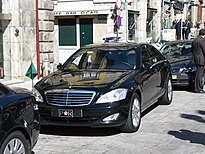 Official Presidential car, model Mercedes-Benz S-Class during 2010.
Official Presidential car, model Mercedes-Benz S-Class during 2010.
-
 Dassault Falcon 50.
Dassault Falcon 50.
Graphical timeline (since 1910)

State visits
For a more comprehensive list, see List of state visits made by the President Marcelo Rebelo de Sousa.Historical rankings of presidents
| President | Party | Tenure | 2018 | 2023 | 2024 | 2025 |
|---|---|---|---|---|---|---|
| António Ramalho Eanes | Ind./PRD | 1976–1986 | 26.7% | 25.7% | 28.4% | 29% |
| Jorge Sampaio | PS | 1996–2006 | 17.3% | 22.3% | 19.2% | 26% |
| Mário Soares | PS | 1986–1996 | 8.8% | 8.8% | 10.8% | 15% |
| Marcelo Rebelo de Sousa | PSD | 2016–present | 39.4% | 27.0% | 15.9% | 14% |
| Aníbal Cavaco Silva | PSD | 2006–2016 | 4.5% | 6.7% | 7.7% | 10% |
| Francisco da Costa Gomes | Independent | 1974–1976 | — | — | — | 1% |
| Undecided | 3.3% | 9.5% | 18.0% | 5% | ||
See also
Notes
- Includes votes for candidate Eduardo Baptista.
References
- "Remunerações dos Cargos Políticos em Portugal". MaisLiberdade (in Portuguese). Lisbon. 6 May 2024. Retrieved 31 December 2024.
Em Portugal, o cargo político com maior salário bruto, e que serve de referência para o cálculo dos restantes salários, é o de Presidente da República, que aufere 9.833€ mensais, seguindo-se o de Presidente da Assembleia da República, com 8.849€, e o de Primeiro-ministro, com 8.296€.
- "Portugal profile - Leaders". BBC. 7 March 2017. Retrieved 8 July 2023.
- Duties of the President – Head of State. Official Page of the Presidency of the Portuguese Republic. Retrieved 31 August 2021.
- ^ "Presidente da República". Diário da República. Retrieved 27 February 2024.
- "Os Presidentes da Ditadura Nacional e do Estado Novo". RTP. Retrieved 27 February 2024.
- "Os Presidentes da 1.ª República". RTP. Retrieved 27 February 2024.
- "Dissolução da Assembleia da República". Diário da República. Retrieved 27 February 2024.
- "Jorge Sampaio vai dissolver Assembleia da República". Público. 30 November 2004. Retrieved 27 February 2024.
- "Sampaio reafirma ilegitimidade da ofensiva militar contra o Iraque". Público. 19 March 2003. Retrieved 27 February 2024.
- "Militares Portugueses partem para o Iraque". RTP. 8 May 2003. Retrieved 27 February 2024.
- ^ "Constitution of the Portuguese Republic" (PDF). Assembly of the Republic. 2005. Archived from the original (PDF) on 3 March 2016. Retrieved 6 June 2014.
- "Belem National Palace". Presidency of the Portuguese Republic. Archived from the original on 2023-10-09. Retrieved 2023-11-13.
Belém Palace has been the Official Residence of the President of the Republic since the establishment of the Republic in 1910.
- Francisco Teixeira (21 April 2011). "Cavaco é o primeiro PR com popularidade negativa". Diário Econónmico (in Portuguese). Lisbon. Retrieved 16 October 2016.
- Ana Sá Lopes (15 July 2024). "Marcelo em baixa, mas melhor do que Cavaco". Público (in Portuguese). Lisbon. Retrieved 17 July 2024.
- "Palácio de Belém". Presidency of the Republic. Retrieved 27 February 2024.
- "Um dia na vida do Presidente Marcelo". SIC Notícias. 14 March 2021. Retrieved 27 February 2024.
- "Sondagem Aximage:Melhor Presidente da República" (in Portuguese). 14 November 2018. Retrieved 13 February 2024.
- "Barómetro Vaga 44 Maio / Junho" (in Portuguese). 1 June 2023. Retrieved 13 February 2024.
- "Eanes é o Presidente preferido. Marcelo passou para terceiro lugar". PÚBLICO (in Portuguese). 28 May 2024. Retrieved 28 May 2024.
- "Marcelo entra no último ano com nota positiva. Eanes eleito o melhor Presidente da democracia". TSF (in Portuguese). 10 January 2025. Retrieved 10 January 2025.
External links
| Heads of state of the European Union member states | |
|---|---|
